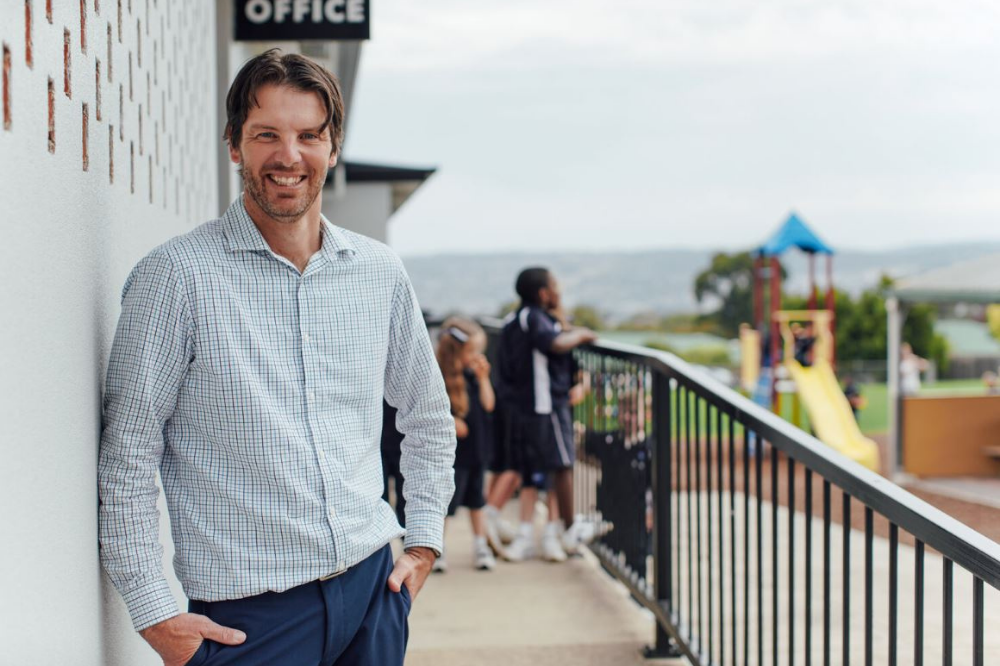
Like most other school principals, Martin Howell, has a lot on his plate. In addition to being the principal at Australian Christian College in Launceston, he’s also one of the teachers – lesson planning and preparing like his staff. To the students, Howell is the technologies or health teacher in the morning; the person to get a bandage from at recess; and the disciplinarian as needed.
But even as he juggles all of these responsibilities, Howell maintains a strong love for the job.
“There are always things to be done, life as an educator will have a never-ending to-do list. There is no point trying to ‘get it all done’ because you never will,” Howell told The Educator.
“For myself, it is about prioritising. Getting those things done that need to be done and then building out around that.”
Recently, Howell noted his every action for the day. From ‘start time’ to ‘end time’, he spent just on one-and-a-half hours on his ‘targeted priority’ for the day.
“Everything else was either ‘planned needs’ like teaching, swimming program, duties and meetings, or ‘immediate action needs’ like phone calls, student behaviour and student wellbeing,” he said.
“There are of course days that the ‘target priority’ doesn’t get done or even looked at well enough because of ongoing ‘immediate action needs’ which can be frustrating but a well-known part of the role that I have undertaken.”
As for the key driving force behind his love for the job, Howell says this is as simple as it is important.
“It’s the same reason many educators got into the profession in the first place – the children,” he said.
“I took the role because for a long time I have worked with young people. Developing them on the tennis court for their tennis ability but more importantly, their growth and development as people. It is the same with working in the school.”
Howell said that while he wants his students to excel academically and be equipped for whatever future endeavours they choose, he also believes “there is more to education than just academics.”
“I want them to learn how to be kind and compassionate human beings. I want them to learn how to work hard and persevere through challenges. In the end, these are the things that will matter most in their lives.”
Better self-care allows for better student care
Howell’s approach to self-care and responsible leadership is that the school window is strictly 8.30am to 3.10pm.
“My focus is the school and what needs to be done so the children have the best opportunity,” he said.
“If that means my ‘targeted priority’ doesn’t get done, it can be done later, when the children are back home with their families. I am also very well aware that I need to have my focus on my family and myself too.”
Howell said that like all professions, workload rules need to be set, and stuck to.
“I get up at 6am but that is for the dog but ultimately that is also good for me. An early morning walk with the 4-legged gets me started and in the ‘fresh air’,” he said.
“I have time in the morning to get some ‘quick admin jobs’ out of the way so I am available for staff, families, and the students if needed. This removes the before school stress if anything ‘pop’s up’.”
At the end of the day, Howell is rarely home after 6pm.
“That is family time, when I am present and available for my family. Do I work at night? Sometimes but only if necessary,” he said.
“On weekends, I generally have one day off with no work but sometimes that doesn’t happen but it never interferes with family-life.”
Teaching kids to be resilient is critical
Howell said that while it is of course important for schools to provide a safe and supportive environment, it’s equally important that students learn how to deal with adversity.
“After all, life is full of challenges, and resilience is the key to overcoming them,” he said.
“Schools need to strike a balance between keeping students safe and teaching them how to handle tough situations.”
Howell said that by providing support and guidance, while also giving students the opportunity to face challenges head-on, principals can help them develop the skills they need to thrive in whatever life throws their way.
“As I endeavour to spend as much time as I can being available, a major continual need over our community, and many communities, is the social and emotional area of students' daily lives and their general wellbeing,” he said.
“We know that if students are not in a good headspace, learning will be a challenge, now and into the future.”
For this reason, Howell encourages parents and carers to communicate with him, or seeks them out if something is seen at school, no matter how small, so he and families can partner “to resolve, encourage, guide and support them as soon as possible to move students forward.”
“We also know that families send their children to our school to be accountable. Whether that is academically or socially [character/behaviour etc], families are looking for that teamwork, so children are held accountable for their actions,” he said.
“There are different types of influences all around them, day and night and with the rise of social media and ‘tween culture’. Ultimately, families want support as they want their child to be successful, in a range of areas.”


